Personal Learning and Development: Student Stress Management Report
VerifiedAdded on 2022/04/15
|6
|1354
|29
Report
AI Summary
This report delves into the critical issue of stress management among university students, examining its profound impact on their learning abilities, overall health, and well-being. It highlights how poor stress management can negatively affect academic performance by distracting students, hindering their ability to concentrate, and ultimately impacting their grades. The report further explores the various physical and psychological effects of stress, including low energy levels, headaches, stomach issues, insomnia, depression, and anxiety. To combat these challenges, the report outlines a range of effective stress management strategies, such as maintaining a healthy diet, avoiding tobacco and nicotine products, setting realistic goals, exercising regularly, and aligning actions with personal values. Additionally, it emphasizes the importance of identifying stress triggers, building strong relationships, and prioritizing rest. The report concludes by reinforcing the significance of effective stress management for student success and overall quality of life.
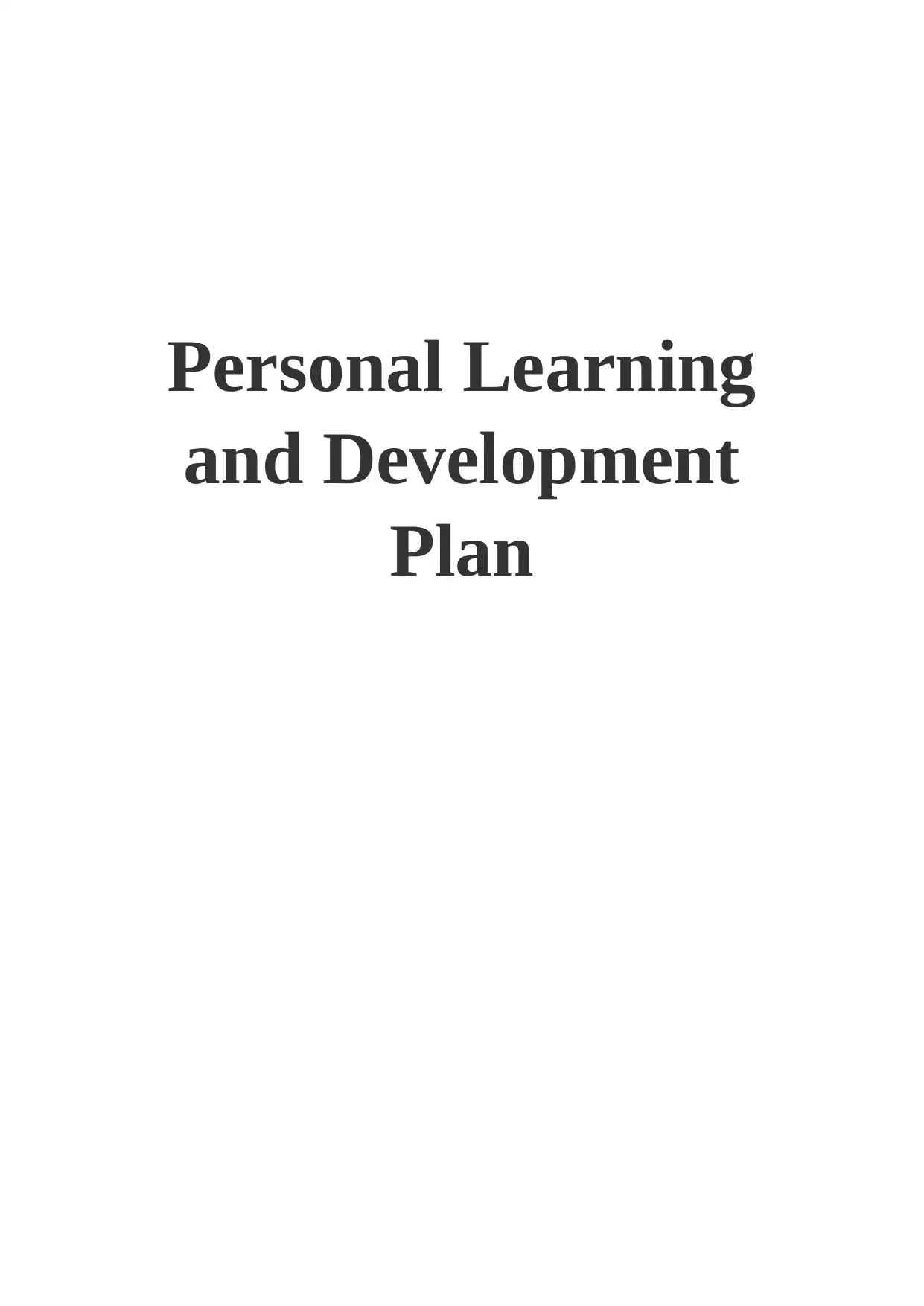
Personal Learning
and Development
Plan
and Development
Plan
Paraphrase This Document
Need a fresh take? Get an instant paraphrase of this document with our AI Paraphraser
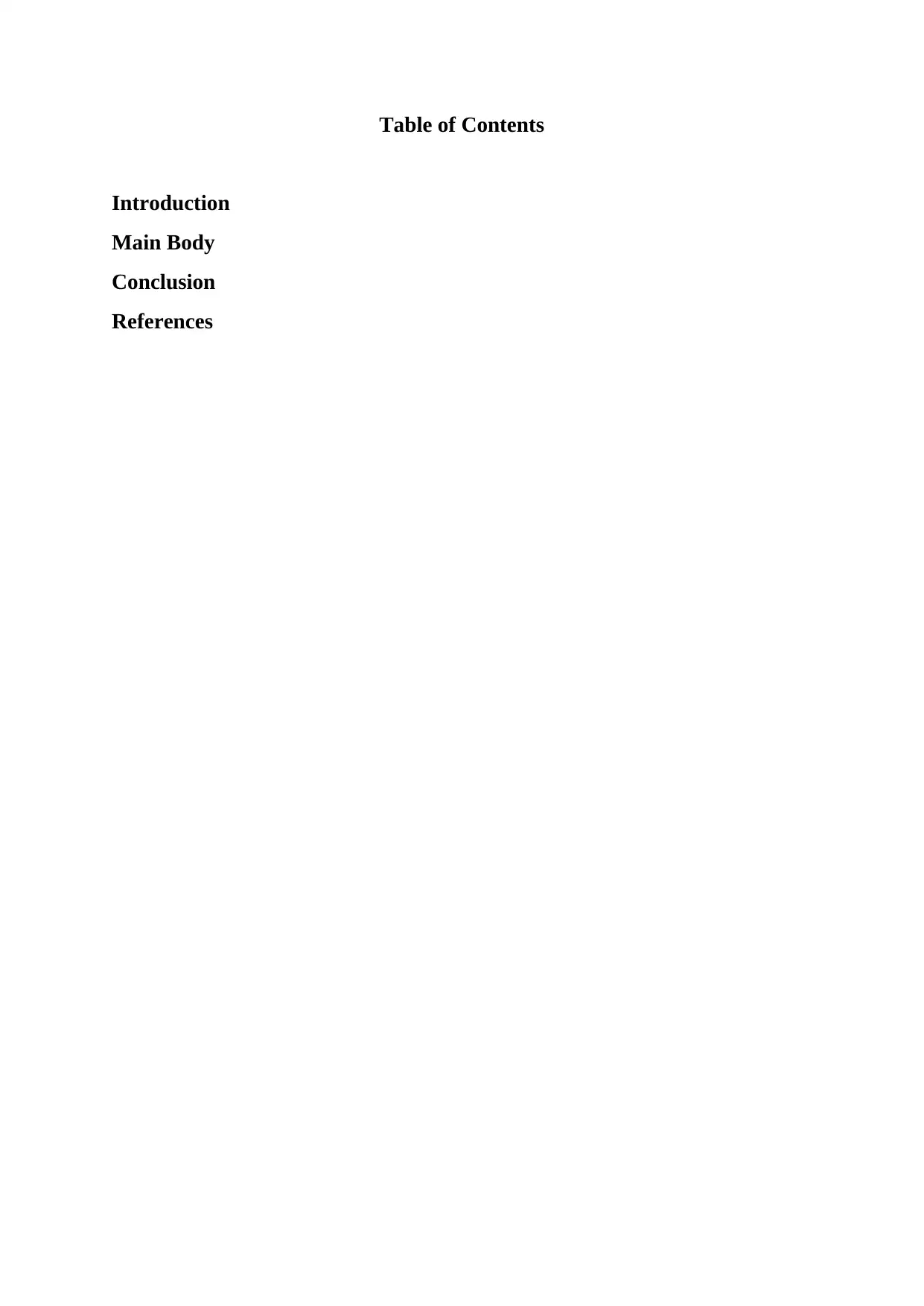
Table of Contents
Introduction
Main Body
Conclusion
References
Introduction
Main Body
Conclusion
References
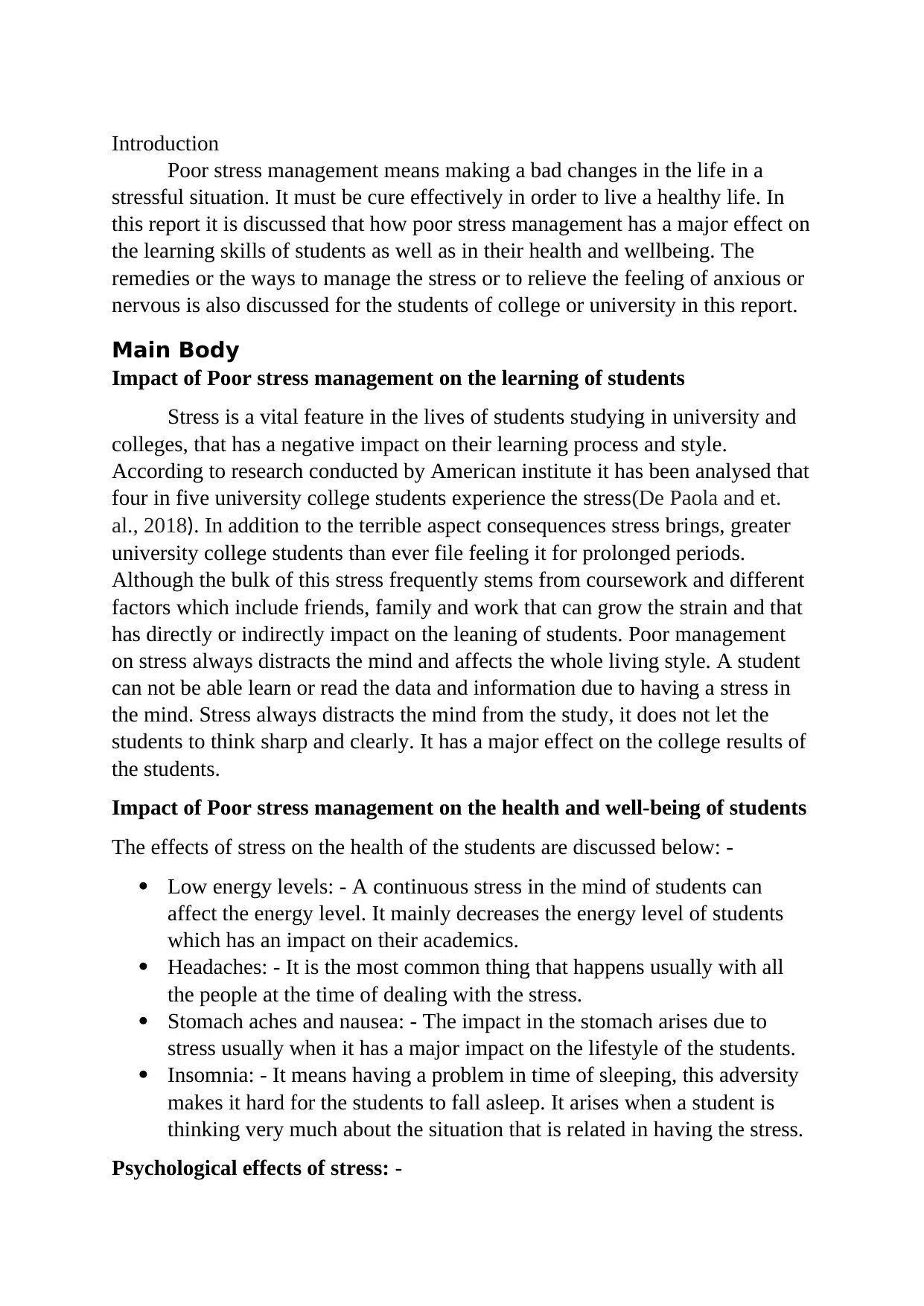
Introduction
Poor stress management means making a bad changes in the life in a
stressful situation. It must be cure effectively in order to live a healthy life. In
this report it is discussed that how poor stress management has a major effect on
the learning skills of students as well as in their health and wellbeing. The
remedies or the ways to manage the stress or to relieve the feeling of anxious or
nervous is also discussed for the students of college or university in this report.
Main Body
Impact of Poor stress management on the learning of students
Stress is a vital feature in the lives of students studying in university and
colleges, that has a negative impact on their learning process and style.
According to research conducted by American institute it has been analysed that
four in five university college students experience the stress(De Paola and et.
al., 2018). In addition to the terrible aspect consequences stress brings, greater
university college students than ever file feeling it for prolonged periods.
Although the bulk of this stress frequently stems from coursework and different
factors which include friends, family and work that can grow the strain and that
has directly or indirectly impact on the leaning of students. Poor management
on stress always distracts the mind and affects the whole living style. A student
can not be able learn or read the data and information due to having a stress in
the mind. Stress always distracts the mind from the study, it does not let the
students to think sharp and clearly. It has a major effect on the college results of
the students.
Impact of Poor stress management on the health and well-being of students
The effects of stress on the health of the students are discussed below: -
Low energy levels: - A continuous stress in the mind of students can
affect the energy level. It mainly decreases the energy level of students
which has an impact on their academics.
Headaches: - It is the most common thing that happens usually with all
the people at the time of dealing with the stress.
Stomach aches and nausea: - The impact in the stomach arises due to
stress usually when it has a major impact on the lifestyle of the students.
Insomnia: - It means having a problem in time of sleeping, this adversity
makes it hard for the students to fall asleep. It arises when a student is
thinking very much about the situation that is related in having the stress.
Psychological effects of stress: -
Poor stress management means making a bad changes in the life in a
stressful situation. It must be cure effectively in order to live a healthy life. In
this report it is discussed that how poor stress management has a major effect on
the learning skills of students as well as in their health and wellbeing. The
remedies or the ways to manage the stress or to relieve the feeling of anxious or
nervous is also discussed for the students of college or university in this report.
Main Body
Impact of Poor stress management on the learning of students
Stress is a vital feature in the lives of students studying in university and
colleges, that has a negative impact on their learning process and style.
According to research conducted by American institute it has been analysed that
four in five university college students experience the stress(De Paola and et.
al., 2018). In addition to the terrible aspect consequences stress brings, greater
university college students than ever file feeling it for prolonged periods.
Although the bulk of this stress frequently stems from coursework and different
factors which include friends, family and work that can grow the strain and that
has directly or indirectly impact on the leaning of students. Poor management
on stress always distracts the mind and affects the whole living style. A student
can not be able learn or read the data and information due to having a stress in
the mind. Stress always distracts the mind from the study, it does not let the
students to think sharp and clearly. It has a major effect on the college results of
the students.
Impact of Poor stress management on the health and well-being of students
The effects of stress on the health of the students are discussed below: -
Low energy levels: - A continuous stress in the mind of students can
affect the energy level. It mainly decreases the energy level of students
which has an impact on their academics.
Headaches: - It is the most common thing that happens usually with all
the people at the time of dealing with the stress.
Stomach aches and nausea: - The impact in the stomach arises due to
stress usually when it has a major impact on the lifestyle of the students.
Insomnia: - It means having a problem in time of sleeping, this adversity
makes it hard for the students to fall asleep. It arises when a student is
thinking very much about the situation that is related in having the stress.
Psychological effects of stress: -
⊘ This is a preview!⊘
Do you want full access?
Subscribe today to unlock all pages.

Trusted by 1+ million students worldwide
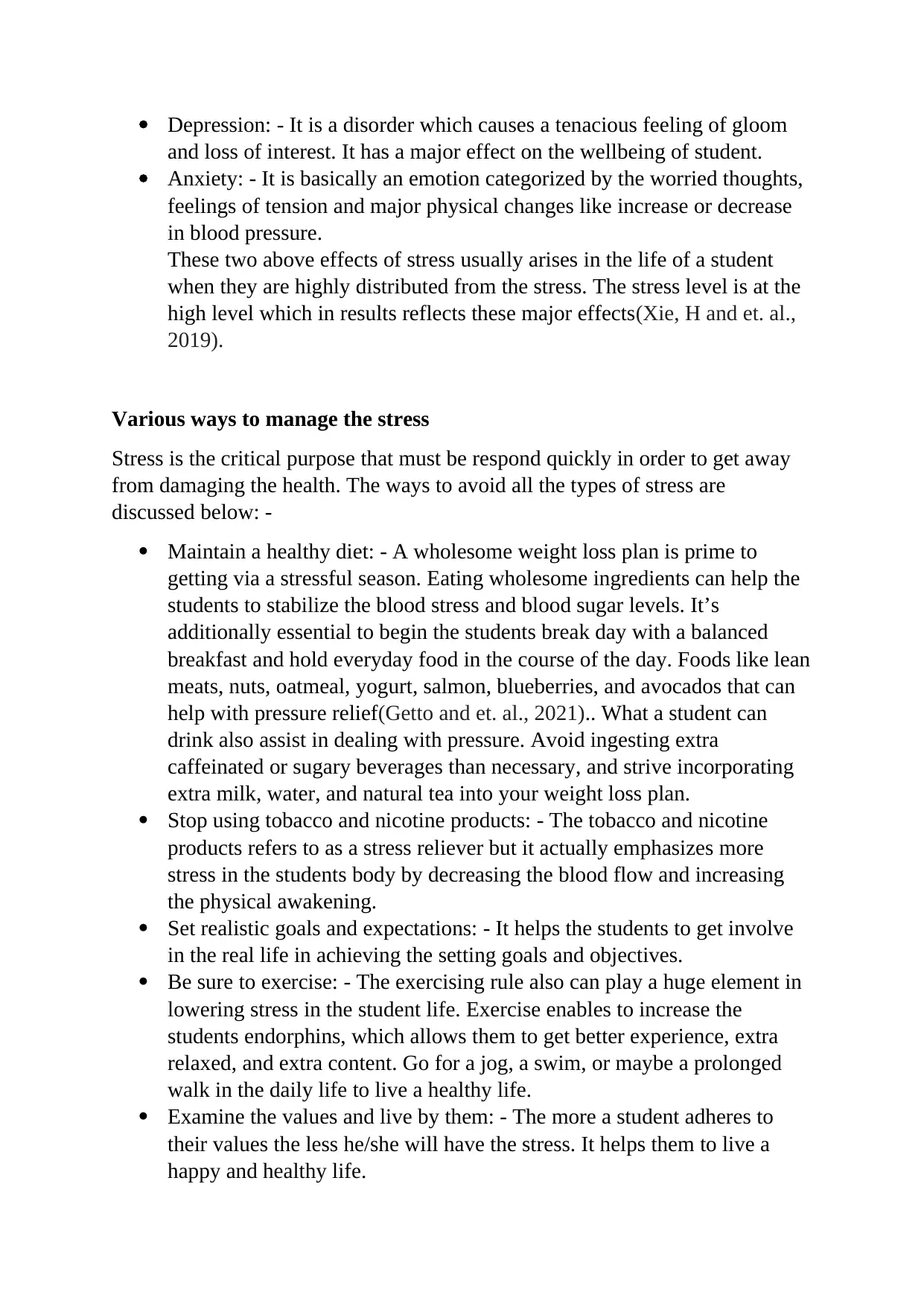
Depression: - It is a disorder which causes a tenacious feeling of gloom
and loss of interest. It has a major effect on the wellbeing of student.
Anxiety: - It is basically an emotion categorized by the worried thoughts,
feelings of tension and major physical changes like increase or decrease
in blood pressure.
These two above effects of stress usually arises in the life of a student
when they are highly distributed from the stress. The stress level is at the
high level which in results reflects these major effects(Xie, H and et. al.,
2019).
Various ways to manage the stress
Stress is the critical purpose that must be respond quickly in order to get away
from damaging the health. The ways to avoid all the types of stress are
discussed below: -
Maintain a healthy diet: - A wholesome weight loss plan is prime to
getting via a stressful season. Eating wholesome ingredients can help the
students to stabilize the blood stress and blood sugar levels. It’s
additionally essential to begin the students break day with a balanced
breakfast and hold everyday food in the course of the day. Foods like lean
meats, nuts, oatmeal, yogurt, salmon, blueberries, and avocados that can
help with pressure relief(Getto and et. al., 2021).. What a student can
drink also assist in dealing with pressure. Avoid ingesting extra
caffeinated or sugary beverages than necessary, and strive incorporating
extra milk, water, and natural tea into your weight loss plan.
Stop using tobacco and nicotine products: - The tobacco and nicotine
products refers to as a stress reliever but it actually emphasizes more
stress in the students body by decreasing the blood flow and increasing
the physical awakening.
Set realistic goals and expectations: - It helps the students to get involve
in the real life in achieving the setting goals and objectives.
Be sure to exercise: - The exercising rule also can play a huge element in
lowering stress in the student life. Exercise enables to increase the
students endorphins, which allows them to get better experience, extra
relaxed, and extra content. Go for a jog, a swim, or maybe a prolonged
walk in the daily life to live a healthy life.
Examine the values and live by them: - The more a student adheres to
their values the less he/she will have the stress. It helps them to live a
happy and healthy life.
and loss of interest. It has a major effect on the wellbeing of student.
Anxiety: - It is basically an emotion categorized by the worried thoughts,
feelings of tension and major physical changes like increase or decrease
in blood pressure.
These two above effects of stress usually arises in the life of a student
when they are highly distributed from the stress. The stress level is at the
high level which in results reflects these major effects(Xie, H and et. al.,
2019).
Various ways to manage the stress
Stress is the critical purpose that must be respond quickly in order to get away
from damaging the health. The ways to avoid all the types of stress are
discussed below: -
Maintain a healthy diet: - A wholesome weight loss plan is prime to
getting via a stressful season. Eating wholesome ingredients can help the
students to stabilize the blood stress and blood sugar levels. It’s
additionally essential to begin the students break day with a balanced
breakfast and hold everyday food in the course of the day. Foods like lean
meats, nuts, oatmeal, yogurt, salmon, blueberries, and avocados that can
help with pressure relief(Getto and et. al., 2021).. What a student can
drink also assist in dealing with pressure. Avoid ingesting extra
caffeinated or sugary beverages than necessary, and strive incorporating
extra milk, water, and natural tea into your weight loss plan.
Stop using tobacco and nicotine products: - The tobacco and nicotine
products refers to as a stress reliever but it actually emphasizes more
stress in the students body by decreasing the blood flow and increasing
the physical awakening.
Set realistic goals and expectations: - It helps the students to get involve
in the real life in achieving the setting goals and objectives.
Be sure to exercise: - The exercising rule also can play a huge element in
lowering stress in the student life. Exercise enables to increase the
students endorphins, which allows them to get better experience, extra
relaxed, and extra content. Go for a jog, a swim, or maybe a prolonged
walk in the daily life to live a healthy life.
Examine the values and live by them: - The more a student adheres to
their values the less he/she will have the stress. It helps them to live a
happy and healthy life.
Paraphrase This Document
Need a fresh take? Get an instant paraphrase of this document with our AI Paraphraser
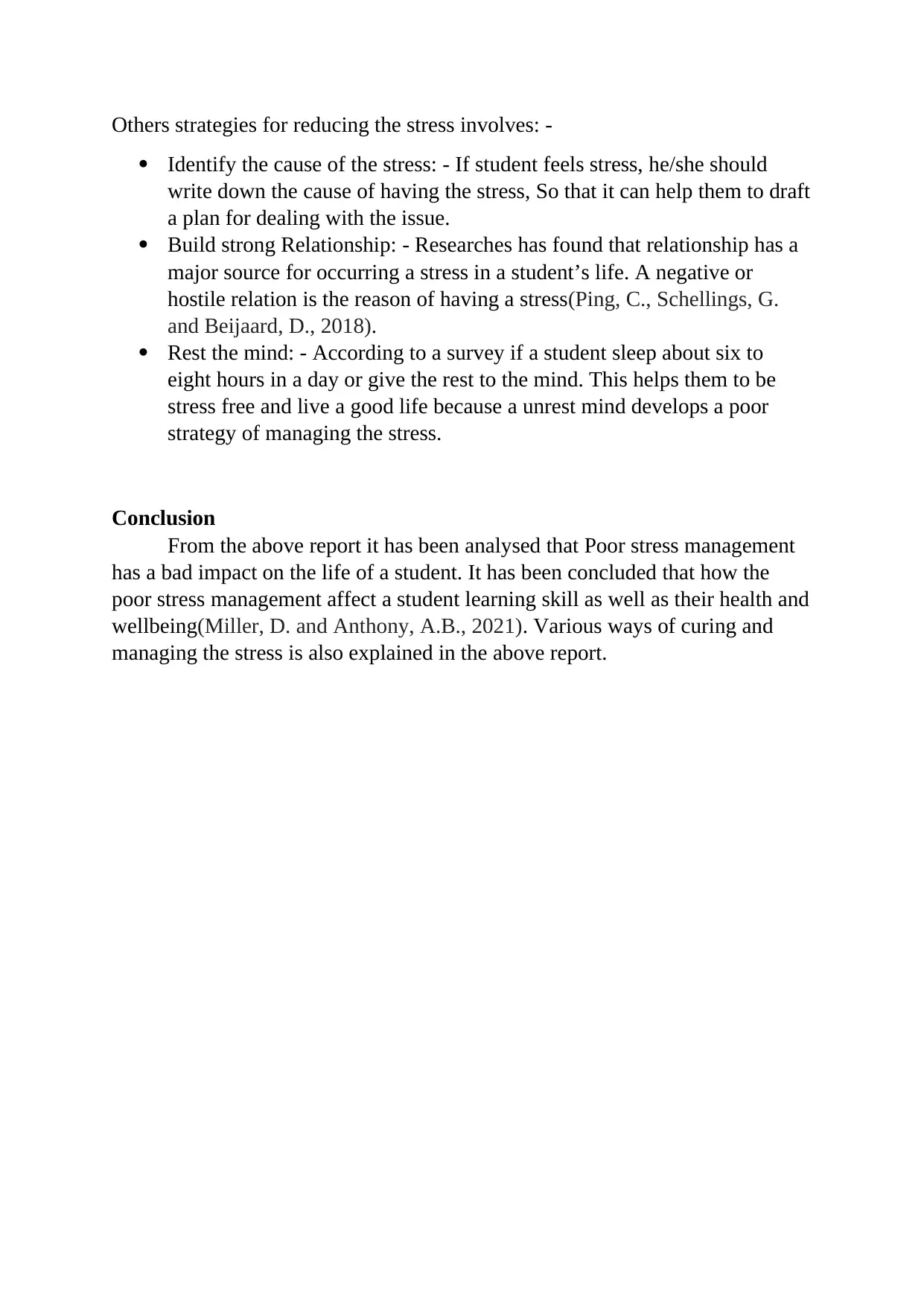
Others strategies for reducing the stress involves: -
Identify the cause of the stress: - If student feels stress, he/she should
write down the cause of having the stress, So that it can help them to draft
a plan for dealing with the issue.
Build strong Relationship: - Researches has found that relationship has a
major source for occurring a stress in a student’s life. A negative or
hostile relation is the reason of having a stress(Ping, C., Schellings, G.
and Beijaard, D., 2018).
Rest the mind: - According to a survey if a student sleep about six to
eight hours in a day or give the rest to the mind. This helps them to be
stress free and live a good life because a unrest mind develops a poor
strategy of managing the stress.
Conclusion
From the above report it has been analysed that Poor stress management
has a bad impact on the life of a student. It has been concluded that how the
poor stress management affect a student learning skill as well as their health and
wellbeing(Miller, D. and Anthony, A.B., 2021). Various ways of curing and
managing the stress is also explained in the above report.
Identify the cause of the stress: - If student feels stress, he/she should
write down the cause of having the stress, So that it can help them to draft
a plan for dealing with the issue.
Build strong Relationship: - Researches has found that relationship has a
major source for occurring a stress in a student’s life. A negative or
hostile relation is the reason of having a stress(Ping, C., Schellings, G.
and Beijaard, D., 2018).
Rest the mind: - According to a survey if a student sleep about six to
eight hours in a day or give the rest to the mind. This helps them to be
stress free and live a good life because a unrest mind develops a poor
strategy of managing the stress.
Conclusion
From the above report it has been analysed that Poor stress management
has a bad impact on the life of a student. It has been concluded that how the
poor stress management affect a student learning skill as well as their health and
wellbeing(Miller, D. and Anthony, A.B., 2021). Various ways of curing and
managing the stress is also explained in the above report.
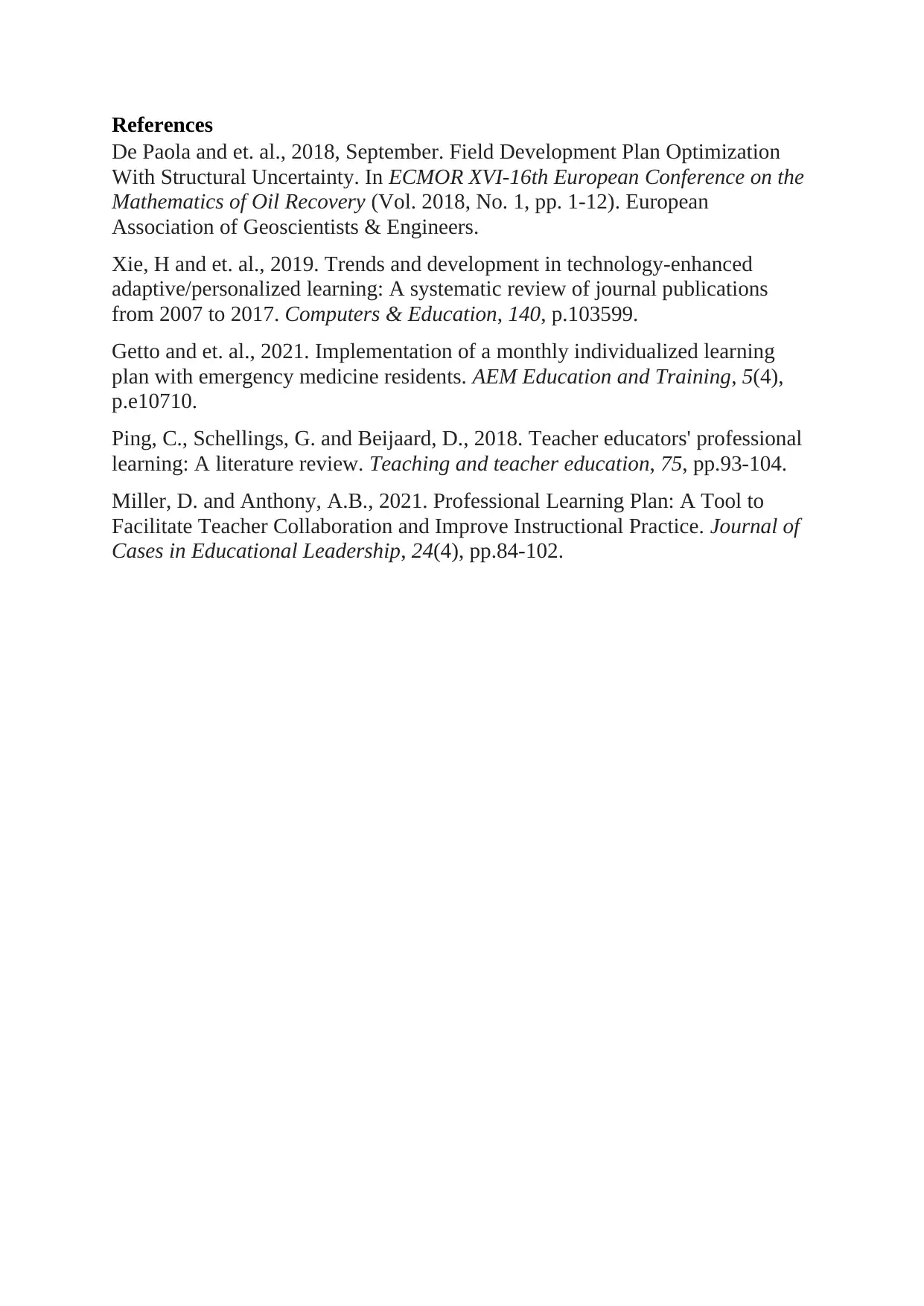
References
De Paola and et. al., 2018, September. Field Development Plan Optimization
With Structural Uncertainty. In ECMOR XVI-16th European Conference on the
Mathematics of Oil Recovery (Vol. 2018, No. 1, pp. 1-12). European
Association of Geoscientists & Engineers.
Xie, H and et. al., 2019. Trends and development in technology-enhanced
adaptive/personalized learning: A systematic review of journal publications
from 2007 to 2017. Computers & Education, 140, p.103599.
Getto and et. al., 2021. Implementation of a monthly individualized learning
plan with emergency medicine residents. AEM Education and Training, 5(4),
p.e10710.
Ping, C., Schellings, G. and Beijaard, D., 2018. Teacher educators' professional
learning: A literature review. Teaching and teacher education, 75, pp.93-104.
Miller, D. and Anthony, A.B., 2021. Professional Learning Plan: A Tool to
Facilitate Teacher Collaboration and Improve Instructional Practice. Journal of
Cases in Educational Leadership, 24(4), pp.84-102.
De Paola and et. al., 2018, September. Field Development Plan Optimization
With Structural Uncertainty. In ECMOR XVI-16th European Conference on the
Mathematics of Oil Recovery (Vol. 2018, No. 1, pp. 1-12). European
Association of Geoscientists & Engineers.
Xie, H and et. al., 2019. Trends and development in technology-enhanced
adaptive/personalized learning: A systematic review of journal publications
from 2007 to 2017. Computers & Education, 140, p.103599.
Getto and et. al., 2021. Implementation of a monthly individualized learning
plan with emergency medicine residents. AEM Education and Training, 5(4),
p.e10710.
Ping, C., Schellings, G. and Beijaard, D., 2018. Teacher educators' professional
learning: A literature review. Teaching and teacher education, 75, pp.93-104.
Miller, D. and Anthony, A.B., 2021. Professional Learning Plan: A Tool to
Facilitate Teacher Collaboration and Improve Instructional Practice. Journal of
Cases in Educational Leadership, 24(4), pp.84-102.
⊘ This is a preview!⊘
Do you want full access?
Subscribe today to unlock all pages.

Trusted by 1+ million students worldwide
1 out of 6
Related Documents
Your All-in-One AI-Powered Toolkit for Academic Success.
+13062052269
info@desklib.com
Available 24*7 on WhatsApp / Email
![[object Object]](/_next/static/media/star-bottom.7253800d.svg)
Unlock your academic potential
Copyright © 2020–2026 A2Z Services. All Rights Reserved. Developed and managed by ZUCOL.




